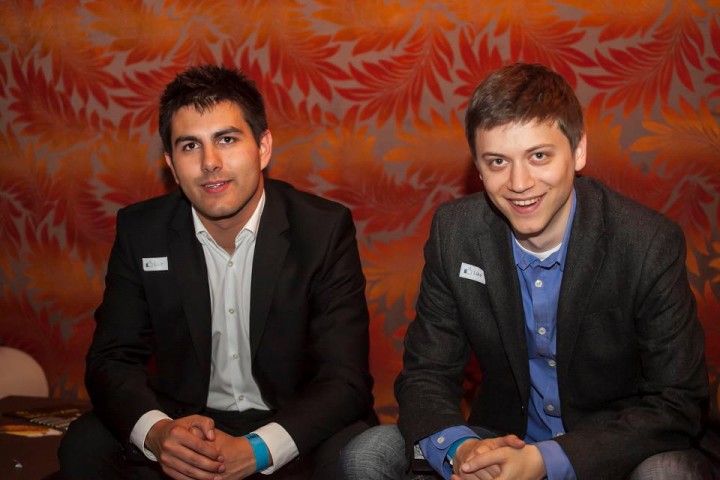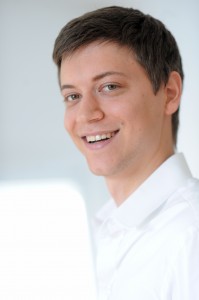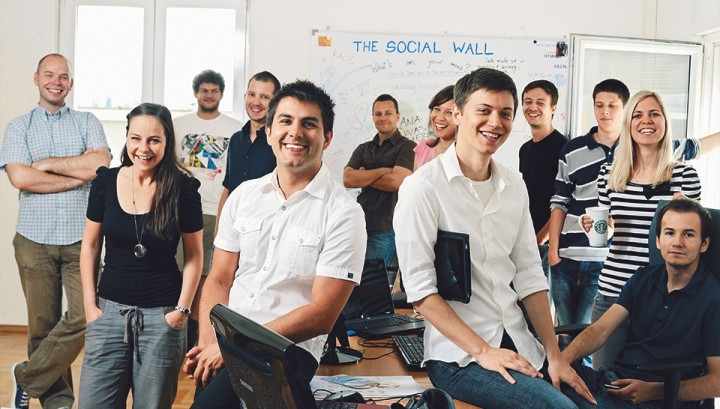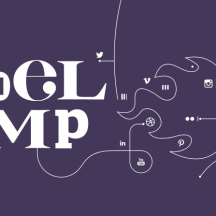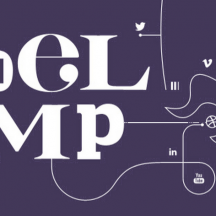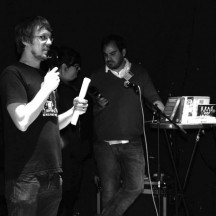Meet Daniel Ackermann, the co-founder of the largest specialized full service social media company in South Eastern Europe. Just when you thought you know it all, Daniel presents you the bright future of the Performance Marketing.
It’s funny how two high-school rivals ended up as successful business partners. How did it all start?
Yes, it’s really funny. Tomislav Grubišić and I met at a math and computer science high-school in Zagreb. We went to different classrooms and we never liked each other. After some time we joined forces and fought other classrooms by developing a website. That was our first co-operation. It was fun and childish and we never thought it would grow into something big and successful, much less profitable.
A school website led to a business development. What was it like for high-school kids to design websites for others?
Well, we went with the flow when it came to programming. We started with websites for minor clients and earned our first money that we reinvested in business (and spent a little bit on having fun too). Although we got big projects, once we finished them, it turned out that we earned €0.5 per hour which wasn’t very satisfying. We were interested in making our own projects. So we made a student website. The main goal was to get the traffic and earn money from advertising.
How did you attract visitors?
We decided to experiment a little. As this was the time when we already started studying at university, we decided to visit other universities, stick posters there, share flyers, organize parties and place PR articles in student newspapers. This also included Google and Facebook ads.
Sounds like fun. Was it successful?
To tell the truth, all that effort was expensive and it brought poor results. We had to come up with a cost-reduced plan, but it was exactly that moment when we got on something big and achieved much better results.
You discovered something very interesting about Facebook. It was your first contact with social media marketing and you weren’t even aware of it.
Exactly! The Faculty of Economics and Business in Zagreb had a Facebook group with 3,000 fans at that time. We asked their community manager to send a message to all the fans. The message included an invitation to our website. Then we sat and waited. Within 5 or 10 minutes after the message was sent, we had about 150 visitors on our website. By the end of the day, 50% of the Faculty of Economics and Business FB page fans came to our site. It even crashed our server. That was a triumph. We felt jubilant. We realized there’s no point in spending money on advertising when we could have it free of charge, efficient and much targeted. Since our main target group included students, this turned out to be a stunner! We discovered a fantastic way of promotion. We tried to find out whether other regional or global agencies did the same, but we couldn’t find any examples back then. That’s when we started building a vast number of FB pages for other universities. Today, it’s called social media marketing.
Is that when you launched iSTUDIO?
Yes. It was July 2009 and the first idea was to produce websites, online advertising and Facebook pages. Within two months, Facebook in Croatia rose dramatically. Our first clients were satisfied and came back for more. It soon turned out that we had no time for anything else but Facebook, and we still keep it that way.
In only five months you managed to catapult iSTUDIO from zero to prominent clients. How much did you earn in those few months?
By the end of the year we had two more employees and reached the revenue of €27.000. It’s not an amazing figure, but when you consider the fact that iStudio was a start-up, you have to admit it was quite a success . Not to mention that July and August are usually holiday months, so the real business got rolling from September till December.
How different was social media in 2009?
Facebook ads weren’t so popular. In fact, hardly anyone used them. Pages were slowly built by just a small number of companies and it was all viral on its own. For example, our Facebook page Jadransko More got 500,000 fans even without being promoted. Applications attracted 100,000 people just like this. Nowadays, pages need ads to promote themselves and applications don’t only provide games but also more advanced options that bring communication on a higher level.
Can you name an example of an advanced Facebook application back then?
Smart Drinks was one of them. The users had to collect drink bottles to get an award. The amazing thing was that the app reached 30,000 users in only five days without a single euro spent on advertising.
What kind of Facebook applications do you create nowadays?
I can mention our quiz application for the Svijetlost medical center. Its fans played it to win free laser vision correction. We asked the fans a question to divide them into two groups. We wanted to find out why they hadn’t undergone vision correction yet. We believed that we could prepare quality communication with people and influence their decision.
What about the rest of the communication?
We offered the fans two answers. That way we found out if they thought vision correction was expensive or if they were simply afraid of the process. Then we targeted the ones who thought it was expensive with communication related to payment methods, like payment in installments or discounts. As for the fans who claimed they were afraid of the operation, we prepared a different type of communication for them. We praised the devices and presented real-life experiences of other patients who already had undergone the operation. So we completely adapted the communication to potential clients and communicated the benefits which would motivate them and make them feel happy about their decision.
In 2012, iSTUDIO was awarded the Preferred Marketing Developer badge by Facebook. That was quite a rare honor at that time.
Yes, we applied despite the strict terms of the application proceedings. They first accidentally lost our application in 2011, so the whole process was prolonged to 2012. We had to show how serious we were about our job because the badge Facebook guarantees your professionalism and quality. That is highly valuable for us especially because we are basically the only agency given this status in Croatia and the region. There are about 200 agencies in the world with this badge, mostly in the USA and the UK. Recently, the terms for receiving the badge have become even stricter.
Talking about the Facebook application production, don’t you think you revealed too much on your website?
No, I don’t. I actually think it’s not easy to copy what we do. We have so many projects going on and we assign our experts to each of them. There are often more than ten people working on a project: programmers, designers, project managers, traffic managers, accounts, juniors, and seniors. Soon we’re going to have also analytic managers and quality assurance managers. We have more than 50 employees. It is very rare to find a social media agency that employs more than 10 people, much less 50. I’m sure there are others with the same knowledge and experiences with us, but hardly anyone would have the number of people necessary for the implementation of complex projects. Without them it would be quite difficult to meet the quality and deadlines requested by the clients.
What do you think about the start-up phenomenon?
It makes me happy to see new start-ups rising. I hope there will be more and more of them. It’s always good to have them. They are smaller, faster and probably more eager because they are fighting tough competition.
Tell us more about iSTUDIO offices in the region.
In 2012 we opened our office in Mostar (Bosnia and Herzegovina) and in 2013 it was Belgrade (Serbia) where we achieve a 100% monthly growth. Brands in these regions search for more advanced dimensions of promotion, too. They ask for real results. It’s good to see that online budgets are growing. We are happy to be part of this digital revolution.
I’ve heard iSTUDIO has a partner company in the USA.
It has. ACM Strategy is a digital advertising company specialized in healthcare. They have a small number of clients in the USA. It’s a country where online and Facebook campaigns require enormously big budgets. We enjoy being partners with them and staying up-to-date.
iSTUDIO creates custom-made Facebook applications, yet you’ve launched Socialpuzzle where clients can make their own generic applications. Isn’t it a conflict of interests?
No, it isn’t, actually. It’s like Apple introducing a new iPod and at the same time producing the iPhone with an integrated mp3 player. We began receiving the same requests over and over, such as photo contests. We figured there’s no point of doing the same thing all over again and we also wanted to start developing more complex projects. Socialpuzzle was our idea of how to offer customized, generic applications that are easy to manage. Cost-sensitive clients can now use them on their own. It turned out to be a great thing. Even smaller companies can now afford a high-quality, good-looking application. Prices depend on the number of page fans. Pages with fewer fans pay less; pages with more fans pay more. We charge on a monthly basis and it’s a win-win product. Soon we’re going to launch a new version of Socialpuzzle. It’ll be cool, don’t miss it!
Socialnumbers is another interesting project. Is it true you produced it to introduce social media to the public?
It is partly true. When Tomislav and I founded iStudio, we were only 22. No one knew us. Our first big project was the Jutarnji List Facebook page with an impressive number of 100,000 fans. Everybody talked about it. It was mentioned at every conference. But no one mentioned iSTUDIO and we did all the work. It was called social media marketing and many agencies started to offer it to different companies who hired them to do the job instead of us.
That’s when you launched drustvenimediji.com, is that right?
That’s right. We published all the official Facebook pages in Croatia and the agencies taking care of them on this website. If someone wanted to check an agency, they could click on its name and check out all the pages they managed, their fans and other activities. We made a list of the agencies. The main criteria were the number of pages managed by each agency and the number of their fans. Everybody could see iSTUDIO had 800,000 fans altogether while the second agency after us showed something like 300,000 fans.
When did you transform društvenimediji.com into Socialnumbers?
In 2010, when everybody saw the impressive number of 800,000 fans on drustvenimediji.com. They finally started to talk about us and we started to receive offers from other countries. Since the original system was too small and the name was Croatian, we had to change everything, including the name. We re-launched it after rebranding it, and it turned out to be a huge success.
How does Socialnumbers work today?
Socialnumbers gives you an insight into analysis, pages’ activities, fans growing, interaction, reports (best and worst posts), even predictions. Agencies can create their profiles free of charge. Clients use Socialnumbers to check who’s on top. High class SEO is provided, too. When someone googles an agency’s name, they mostly find the agency first and then its name on Socialnumbers. Cool, isn’t it?
I’m sure the Czech Babel Guide readers would like to hear what you think about their countrymen, Socialbakers?
I absolutely respect Socialbakers, they are big. I know they employ about 200 people. The Facebook analytics they do is impressive. I’m sure they’ll keep up the good work in the future. We do need companies like that in CEE.
iSTUDIO has recently launched its new, promising product Mediatoolkit. I’ve noticed it’s been praised by very satisfied users. Can you tell us more about it?
It’s a tool which helps you discover the latest breaking news in any industry you choose. It was designed for journalists and other media professionals. With Mediatoolkit it is easy to have all your favorite media in one place. It recognizes important news within 10 minutes after they are released and sends you an email alert. If you are a journalist, you can write the same piece of news in your own language and publish it before others. Another interesting thing about Mediatoolkit is that it analyzes the content quality. For example, when you choose the media you want to follow, Mediatoolkit presents the most shared news at the specific time. You can watch my presentation from BabelCamp below.
iSTUDIO has recently transformed itself into the Performance Marketing agency. What does that mean for you and the clients?
iSTUDIO started as a social media agency. At that time, social media presented a big potential to us in creating great campaigns for our clients. At the same time, it was a totally unknown area for us. As we grew, we had more and more satisfied clients who also asked for other services. For some time we kept refusing them to stay focused on our ongoing projects. Since the campaigns we did became more integrated and more focused on Facebook, we started to include other channels as well, e.g. Google remarketing in a Facebook application, newsletter communication with application users and so on. We began to realize how great we’d been managing other channels and how our main competence was not in social media, but rather in results orientation. Of course, being result-oriented didn’t include only social media but other channels as well. Nowadays, apart from social media, our work also includes Google advertising, website production and newsletter marketing. We didn’t want to choose the channels with the highest margins and profits but rather those that showed the most satisfactory performance for our clients because our goal was to offer them only the best channels with the most realistic results they could get. Today, more than 30% of our work is done on Google and other platforms, not just Facebook. We are proud to have more AdWords certificated professionals than any other agency in the region.
How clearly do clients understand the purpose and benefits of this fastest-growing marketing model?
We explain to our clients that they should determine their true business goal with us. They must understand that the impressions, clicks, views etc. are not exactly what they want to achieve. It’s the revenue, isn’t it? And that’s exactly what we’re trying to make them understand at the beginning. And when we set the first step, we continue to the next one.
What does the Performance Marketing process look like then?
The next step is to determine clients’ advertising channels (FB, Google, newsletter, etc.). Then we define the measurement system where it is clear how much money is spent and earned for each of the channels and if the ROI is as they expected it to be. The channel with the lowest ROI is excluded from the further advertising list. Then the budget is planned according to the channels which provide the highest ROI. The most important thing of this measurement process is to get the accurate feedback from advertising channels to direct the brand towards the channels providing the most satisfying ROI. Once the measurement system is set, we prepare the optimization of the chosen advertising channels.
This helps companies attract the real purchasers to their websites, is that right?
Exactly. Yet the job is not done there. To lower the percentage of the visitors who leave the web before they actually make a purchase, we design a variety of different user interfaces, measure their conversion and test them among customers. We watch the visitors’ behavior on each of the pages and see their interaction. That helps us decide on the most attractive design and create its final version. This is what makes the Performance Marketing an amazing model for focusing on the targeted audience that will meet the companies’ expectations and help them reach their business goal. For example, if a website has €10 000 of monthly revenues and the conversion rate is 0.5 %, if we increase the overall conversion by only 0.5 %, it brings €10 000 of new revenues each month.
I understand you’ve raised an investment in iSTUDIO. How does the co-operation work?
The decision to involve investors has been one of the best since we founded iStudio. We have a highly valuable partnership and we are extremely proud of it. RSG Capital has proved to be our unique guardian angels, not just investors. They are down-to-earth, very realistic with great knowledge and high class contacts. They advise us, support us and complement our team.
What led you to RSG Capital?
As students starting their own project, we had no financial back-up. When we earned something, we immediately invested it in further development. As an extremely ambitious team, we had innovating ideas and plans for a global success. It’s true we could’ve started saving but we would waste the precious time. This is a sort of business which has no mercy for delays. If you have a vision, not to mention innovative projects, you simply do not wait. If you do, someone else will fill the gap. Therefore, we found RSG Capital as our perfect partners.
What do iSTUDIO’s future plans look like?
We’re planning to invest part of the money in new staff to be able to offer even better products and services to our clients. Another part is going to be invested in internationalization to address Western markets. We have already made plans for our next international office in a much bigger market – and once this is carried out, we have still more to come. Btw. just days ago, we have launched HivePeek – another interesting project of ours 
What does iSTUDIO see as the next big thing in the digital future?
Clients’ budgets are switching more and more to the online world. The display ads have slowed down or even stagnated while Facebook and Google keep rapidly growing. The mobile Internet is also showing a huge growth and video advertising has finally reached its power while the best of it is still coming. IPTV is rising, too. The future of IPTV presents a real threat to traditional TV. A very interesting time is ahead of us.
This post was written by Martina Vuksan: follow her on Twitter, connect on LinkedIn or Facebook.
